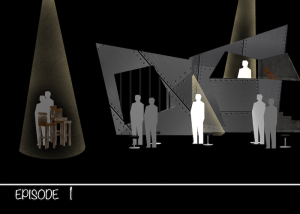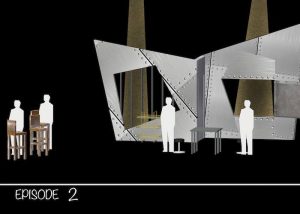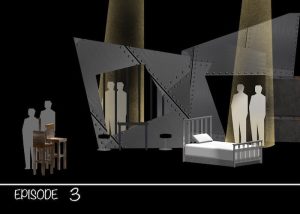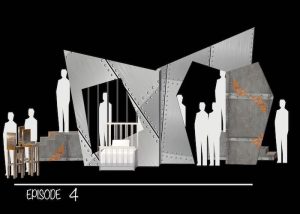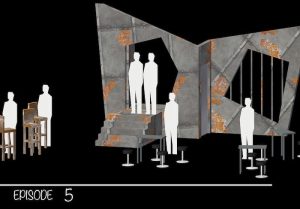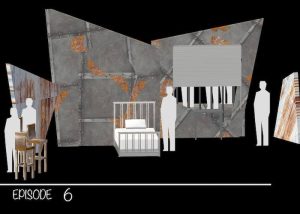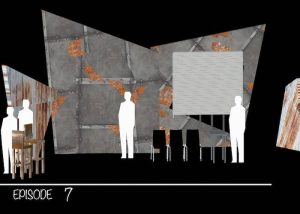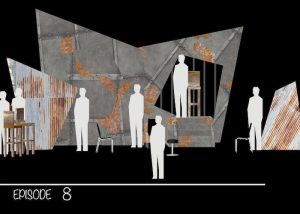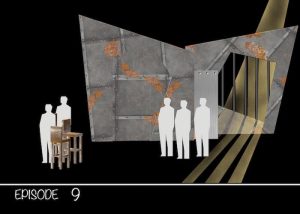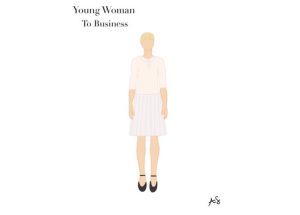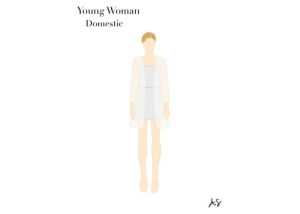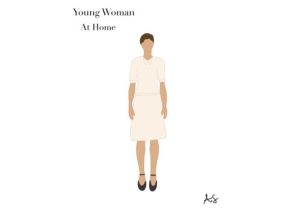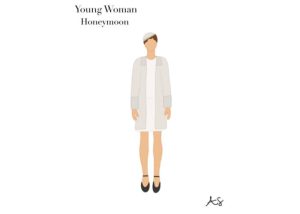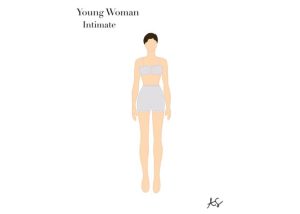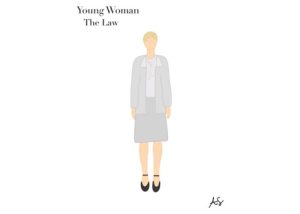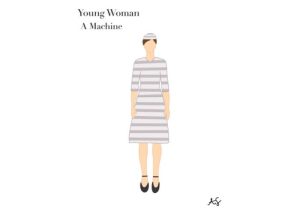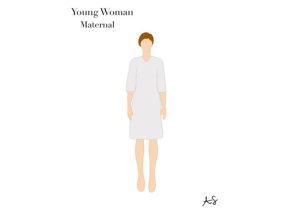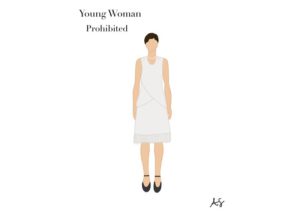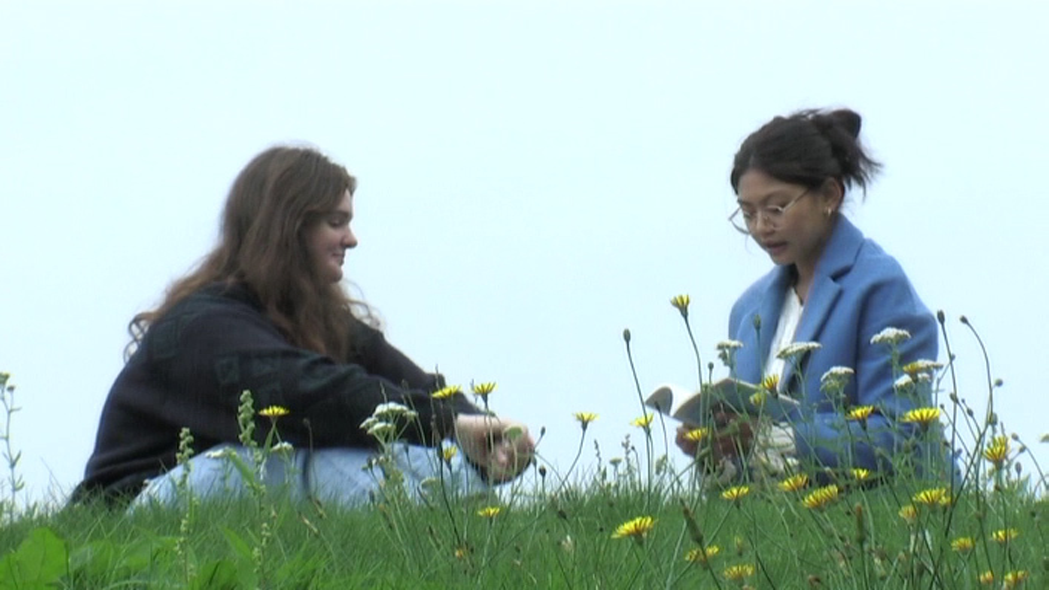

Artwork by Jonathan Wood
Machinal
By Sophie Treadwell
Directed by MFA Director Laura Di Cicco
Unable to gain financial independence in the 1920s, a young woman is drawn into a loveless marriage with her boss. Machinal explores the societal expectations and restrictions put on women. Driven by desperation for freedom, our protagonist kills her husband. Yet the play refuses to point fingers. Who is to blame? You decide.
Looking at ourselves as a society takes work. We often need to sit in some very uncomfortable realizations about who we are as people. Sometimes, those realizations need to shake us out of our seats in order to force an examination.
I come from an older generation of adults: the end of the baby boomers, the beginning of Generation X. One might argue that the two generations springboarded a kinder, more enlightened society. Or did we?
My parents grew up during the time period that Machinal takes place. It was the Interwar period of the 20th century and it was a time of incredible upheaval and change. Their stories and experiences influenced my interest in social justice. In looking at how they lived and what they experienced, as an artist, I often find myself reflecting on our society today.
During the Interwar period, we saw the rise of several movements: communism, fascism, civil rights, and feminism. Freedoms were being demanded, yet freedoms were also being taken away. The Russian Revolution solidified a communist dictatorship in Russia. The rise of Hitler and Mussolini in the 1920s solidified fascism in Europe. In the United States, Reconstruction was being dismantled in favour of disenfranchisement and segregation. Women in the United States received the vote in 1920. In Canada, the right to vote across the country was granted in 1918, but it was another 11 years before women were officially recognized as “people”. Even then, this status was only granted to white women. Indigenous peoples did not receive the right to vote until 1960.
On an artistic level, extremely creative ideas were emerging and taking place. Expressionism in theatre, while short-lived, was at its peak in the 1920s. It fostered a creative revolution of sorts that revealed artists were thinking seriously about society. Germany was one country where Expressionism took a strong and bold foothold. In reflecting on society, the artist believed in bold and risky imagery that had the purpose of creating societal transformation. Expressionism pushed away Realism and instead chose to focus on the conflicted “inner mind” of the protagonist, revealing a loss of individuality within society.
It is this loss or struggle for identity that is at the heart of Machinal. A woman is unable to live up to the gender roles imposed on her by a white, male-dominated, mechanical society. In this struggle, we also see that she is not perfect: she struggles to find exactly how to be free. In her self-examination, a certain “realism” is able to emerge, while everyone else around her appears merely as robots or mannequins—people who are not quite complete, and who conform to their expected roles in society simply because it is easier to do so than to do the work of challenging authority.
There is a hierarchy in Machinal. There are levels of privilege that all the characters embody. Even the Young Woman herself enjoys a privilege that is lost on her. She is a white woman in a white-dominated society, which is far more privileged than any person of colour or a person whose sexual orientation or identities differ. Her sexual orientation is legal and she does not need to hide her identity, whereas someone with a different identity and orientation would be jailed or even murdered if anyone knew how they identified. The Young Woman also has access to better jobs, education, and healthcare—far more than any person of colour.
I feel that it was this time period that shaped much of the 20th century and continues to have influence now. There are many things that can be learned from this time period by looking at what is comparable. When we see contemporary movements such as #MeToo, #BlackLivesMatter and #EveryChildMatters, along with the audacious movements of Trumpism and the Alt-Right, can we say much has changed?
Machinal was written in 1928, and I have chosen to keep it in 1928. Given this, I’d like to acknowledge that there are several references in this play that speak to the language and attitudes of that particular time period. While normalized then, such references today would not be considered appropriate. I’d like to thank our cultural consultant, Omari Newton, for his assistance in working with myself and our cast to determine the most suitable way to mount this production. Through careful consideration, we present you with the show you are about to see.
—Laura Di Cicco, Director
Credits
Nduduzo Leroy Hikwa — Singer
Ruairi MacDonald — First Man, Reporter 2, Singing Voice, Barber 2, Janitor
Conor Meadows — Husband, Waiter, Passing Feet, Clerk 1, Guard 2
Fiona Jenkins — Telephone Girl, Young Woman, Passing Feet, Singing Voice, Clerk 2, Guard 1, A Wife
Robyn Shanks — Mother, Nurse, Dancing Couple, Young Woman, Passing Feet, Singing Voice, Reporter 3
Dylan Nouri — Bellboy, Doctor, Second Man, Singing Voice, Judge, Priest
Nicolas Olney-Rainville — Adding Clerk, Dancing Couple, Stretcher Wagon, Older Man, Passing Feet, Huckster, Prosecuting Lawyer
Blake Buksa — Filing Clerk, Young Doctor, Boy, Passing Feet, Singing Voice, Bailiff, Young Woman, A Husband
Gabrielle Nebrida-Pepin — Stenographer, Young Girl, Woman in Wheelchair, Policeman, Young Woman, Singing Voice, Matron
Belén Quirce — Young Woman, Dancing Couple, Woman in Bathrobe, Girl, Passing Feet, Singing Voice, Reporter 1
Isabel Hansen — Small Boy, Young Woman, Passing Feet, Singing Voice, Defence Lawyer, Man at Table 1
Isabella LaEsecke — Young Boy, Dancing Couple, Nurse with Basin, Passing Feet, Singing Voice, Young Woman
Mai Stone — Wife, Dancing Couple, Extra Man, Passing Feet, Young Woman, Clerk 3, Nurse with Tray
Tirion Jones — Young Woman, A Mother, Dancing Couple, Woman Table 1, Passing Feet, Singing Voice, Jailer, Court Reporter
Laura Di Cicco — Direction
Megan Gilron — Intimacy Direction
Phay Moores — Intimacy Direction
Omari Newton — Cultural Consultant
Marlise McCormick — Movement Coach
Sheila Langston — Vocal Coach
Hallie Marshall — Latin Pronunciation Coach
Allie Cao — Scenic Design
Zoe Lin — Asst. Scenic Design
Isabelle Barlow — Scenic Artist
Mira Robinson — Lighting Design
Cheyane See — Asst. Lighting Design/2nd. Asst. Technical Direction
Olivia Chen — Asst. Projection Design/Asst. Scenic Design
Kai Wong — Projection Design
Bekah Lazar — Sound Design/Sound Operator
Zac Labrie — Sound Design
Amber Smith — Costume Design
Jamie Ragins — Asst. Costume Design
Elyse Wall — Stage Management
Yuting Yue — Asst. Stage Management
Lauren Semple — Asst. Stage Management
Hannah Abbott — MFA Technical Direction
David Moise — Asst. Technical Direction
Cassie Gilbert — Asst. Production Management
Kelsey Peterson — Run Crew (Fly Op, Revolve Op)
Ben Paul — Run Crew (Stair Master, Costume Lead)
Samantha Cheng — Run Crew
Aaron Au — Run Crew
Joy Cheng — Sound Operator
Emily Chang — Lighting and Projections Operator
Hannah Abbott, Roohi Kamal — Properties
Celeste Mol, Caroline Tang — Costume
Olivia Chen, Crystal Luo, Jamie Ragins, Sofie Fougere, Grycel Tercero, Kelsey Peterson, Kaleigh Funnell, Emma Hamilton, Yena Lee, David Siu, Nina Yu, Saphia Eddie, Cheyane See, Kathleen Boldakin, Isabelle Barlow, Finnley O’Brien, Stephanie Barclay, Madeleine Polak, Betsy Sun, David Moise, Cooper Mortimer, Aaron Au, Hayley Bamford, Ben Paul, Roohi Kamal, Brendan Lowe,
Grace Nguyen, Yun Shim, Mattias Kammueller, Kai Wong, Muleba Chailunga, Joy Cheng, Nyssa Estrella, Zoe Lin, Hallie Nguyen, Huda Shawwash
Stephen Heatley — Department Head
Chelsea Haberlin — Direction
Patrick Rizzotti — Scenic
Brad Powers — Technical Production
Lorraine West — Scenic Paint
Robert Gardiner — Lighting
Patrick Pennefather — Sound
Jacqueline Firkins — Costume
Collette Berg — Stage Management
Borja Brown — Production Manager
Cam Cronin — Department Administrator
Erika Champion — Staff Technical Direction (Lights and Sound)
Ryan Murcar — Staff Technical Direction (Scenic)
Lynn Burton — Head of Properties
Jodi Jacyk — Head of Wardrobe
Tony Koelwyn — Audience Services Manager
Andrea Cheng — Communications Specialist
Jiejun Wu — Marketing and Communications Assistant
Sarah Crauder — Film Program Administrator
Dmitri Lennikov — Film Collections Coordinator
Stuart McFarlane — Film Equipment Manager
Ian Patton — Academic Administrator
Karen Tong — Theatre and Film Studies Graduate Secretary
Design Portfolio
Schedule
Preview
Wednesday, November 24
7:30 pm
Performances
Thursday, November 25–Saturday, December 4
7:30 pm
Student Talk Back
Tuesday, November 30
After the show
No performance on Monday, November 29.
Location
Frederic Wood Theatre
6354 Crescent Rd, Vancouver, BC V6T 1Z2
We acknowledge that the UBC Vancouver campus is situated within the traditional, ancestral and unceded territory of the Musqueam.
Ticket Prices
Adult: $24.50 Senior: $16.50 Student: $11.50
For any questions, please contact our box office: 604.822.6835 or box.office@ubc.ca.
